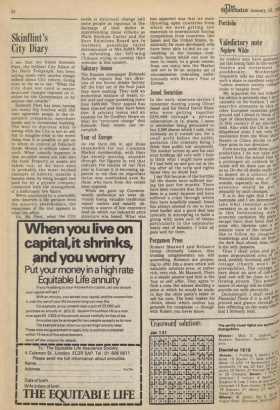Skinflint's City Diary
I see that my friend Kenneth Fleet, the brilliant City Editor of the Daily Telegraph, has been saying some very unwise things indeed about City reform. Going even so far as to say: "What the City does not need is major structural changes imposed on it, either by the Government or by anyone else outside."
Kenneth Fleet has been having too many big lunches with the very agreeable people in the insurance companies, merchant banks and in investment banking. The way to discover what is wrong with the City is not to ask but to imagine what is the worst thing that it is possible to get up to when in control of fiduciary funds. Money is seldom taken as such. What usually happens is that so-called assets are sold into the fund. Property or assets are taken out, as we have seen in probably the most wicked example in history, outside a banana state, by being bought and paid for by a private company connected with the management at a ludicrously low figure.
When uncovered by a journalist, who deserves a life pension from the minority shareholders, the repayment of the loot appears to close the affair.
No, Mr Fleet, what the City needs is structural change and some people as rigorous in the discharge of their duties in apprehending these villains as Mark Bonham Carter and the Race Relations Board are in fearlessly punishing racial discrimination or Mrs Judith Hart in defending the left-wing Chileans trying to outstay their welcome in this country.
Salutary lesson
The Russian newspaper Babinski Rabochi reports that two directors of the Soviet drinks factory left the fruit out of the fruit juice they were making. They sold an economical mixture of water, citric acid and sugar pocketing more than £400,000. Their appeal has been rejected and they have been shot. A salutary lesson and an example for Sir Geoffrey Howe on what the "structural change" that Kenneth Fleet resists can accomplish.
Year of Europe
As the facts ink in and those responsible for our Common Market membership, with their lips slowly moving, stumble through the figures in red that indicate the results of our first year in Europe it is becoming apparent to me that an important factor was overlooked even by those who have from the outset been opposed.
When we gave up Commonwealth preference we were obviously losing valuable traditional export outlets and equally obviously a source of less expensive food on which our industrial price structure was based. What was less apparent was that we were throwing open countries from which we were getting raw materials to international buying competition from countries, like Japan and the United States, industrially far more developed, who have been able to bid us up — resulting in the ruinous com modity boom which can now be seen to result, to a great extent, from our entry into the Market and not to be an unlucky set of circumstances coinciding unfortuitously with Britain's Year of Europe.
Jessel Securities
In the early nineteen-sixties I remember meeting young Oliver Jessel and his friend David Shaw who were getting together £250,000 through a private subscription in Is. shares. I seem to remember being persuaded to buy 2,500 shares which I sold, very unwisely as it turned out, for a small profit before the public quotation (the company being I think then public but unquoted). The market turned up and his unit trust holdings did very well. I hate to think what I might have made if I had held on and got out at the top after all the scrip and rights issues they no doubt had.
I say this because of the horrible fall the shares have suffered during the past few months. There have been rumours that they have been in a nasty squeeze and have suffered a crisis through which they have hopefully passed. Jessel has always seemed to me to have tried harder and a good deal less cynically in attempting to build a group with some sort of theme particularly in the unpopular heavy end of industry. I trust all goes well for them.
Pergamon Press
Robert Maxwell and Reliance Group (formerly Leasco, that trusting conglomerate) are still quarrelling. Reliance are proposing to offer 10p a share which will naturally infuriate poor, or rather rich, very rich, Mr Maxwell. There is a simple answer and that is the 'buy or sell' offer. They agree to flick a coin, the winner deciding a price at which he would be ready to buy the other party's stake or sell his own. The loser makes his choice, about which neither has grounds for complaint — though with Robert you never know.


































 Previous page
Previous page